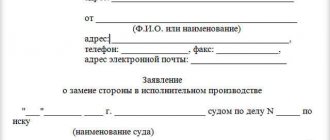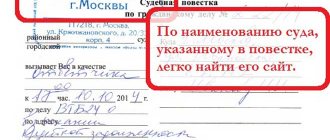How to find out about enforcement proceedings and its termination
In accordance with 229-FZ “On Enforcement Proceedings”, the SPI is obliged to notify the parties about the beginning and termination of enforcement proceedings, and about the activities carried out within its framework. This is done by sending written notifications to the place of residence (or registration) of both parties to the conflict, which entailed a trial and the initiation of enforcement proceedings.
But often this is not enough and debtors, like collectors, remain in the dark about the stages of debt collection and the measures taken by the SPI. Therefore, it is worth periodically checking on your own what is happening with your production facilities.
You can do this in the following ways:
- Through State Services.
In the settings of the portal’s personal account, there is an option to send email notifications when the amount of legal debt changes. Then, when new ones appear or old ones are completed, corresponding letters will be sent to the user’s mail. But this is only in theory - in State Services, information about court debts is often displayed incorrectly, so this method of monitoring collections should be taken as a backup. - At the bailiff's office in person. This method is good when you know which bailiff is or was conducting your enforcement proceedings. Then it is enough to visit him during reception hours - the debtor will be able to find out this information on the website of the territorial department of the FSSP.
- If you do not know the name of your specialist in the SPI, you can clarify information about him and about the penalties in force against you at the reception of the FSSP department.
- Through the FSSP website in the “Data Bank of Enforcement Proceedings” section. Everything is simple here - you need to select your region, your full name and date of birth. Then all active and terminated enforcement proceedings for your debts will be displayed on the screen, indicating the amount of debt (but not always), as well as the name and contacts of the bailiff.
- Using mobile applications. You can install applications from the FSSP or State Services on your smartphone, available in the official app stores for Android and iPhone.
In addition, some banks notify their clients via SMS about the seizure or removal of seizure from accounts by bailiffs. For example, you received an SMS from Sberbank from number 900, which states that “collection on the card has been stopped... (followed by the number and date of the bailiff, the name and contacts of the bailiff).” This means that enforcement proceedings against you have been terminated, canceled or suspended.
How to resume suspended production
In a number of cases, enforcement proceedings may be suspended by the court or the bailiff (Articles 39–40 of Law No. 229). The main reason for resuming enforcement proceedings is the elimination of the circumstances due to which it was suspended (Part 2 of Article 42).
For the court to resume in accordance with Part 1 of Art. 438 of the Code of Civil Procedure of the Russian Federation, proceedings suspended by his decision are required:
- Submission by the claimant or bailiff of the corresponding petition.
- The actual elimination of grounds that impede the progress of enforcement proceedings.
In addition, according to Part 2 of the above article of the Code of Civil Procedure, the period for which the proceedings were initially suspended may be reduced by the court.
Resumption by the court
Analysis of Art. 39 of Law No. 229 makes it possible to determine what circumstances must be eliminated in order for the court to resume suspended proceedings.
The court will decide to resume proceedings if:
- a claim for the release of seized property has been refused;
- there is a result of the court considering issues related to challenging the result of the assessment of property under arrest or the collection of an enforcement fee;
- the debtor returned from a long business trip;
- the claim to challenge the writ of execution has been rejected or the procedure for challenging the judicial act under which it was issued has been completed.
The decision to resume proceedings is made by the same arbitration court that initially issued the executive document and then suspended it (Part 1 of Article 45 of Law No. 229), or by the one that is closer to the place where the performer’s activities are carried out.
Resumption by bailiff
The bailiff may suspend the proceedings if one of the parties submits a corresponding substantiated application to him (Part 4, Article 45 of Law No. 229). To resume proceedings, you will need to make sure that the grounds for suspension of proceedings have been eliminated, or receive a corresponding application from the claimant (Part 7).
Based on the analysis of the provisions of Art. 40 of Law No. 229, we summarize the information on what grounds the executor can resume proceedings:
- the debtor or claimant returned from the combat zone or stopped performing tasks during a state of emergency (clause 3, part 1);
- the debtor completed treatment in a hospital (clause 1, part 2);
- the recognition of the debtor as missing or dead due to his appearance was canceled (clause 1, part 1);
- the debtor restored its solvency and financial solvency by exiting the bankruptcy procedure (clauses 5 and 5.1 part 1);
- the period of deferment of fulfillment of the obligation granted by the court has expired (clause 6, part 1);
- the seizure of the property of the debtor organization directly involved in the production process has been lifted (clause 7, part 1);
- lack of property from the debtor - a foreign state (clause 8, part 1);
- the previously wanted debtor was found (clause 2, part 2);
- the debtor-conscript returned from the army (clause 3, part 2).
Proceedings may be suspended by senior officials of the executive service (Part 3 of Art.
40 of Law No. 229) or the court (Part 3 of Art.
39 of Law No. 229) due to the receipt of a complaint about the actions or inaction of the bailiff. To resume the proceedings, it is necessary that the body considering the complaint of one of the parties to the proceedings or the decision of the executor does not find grounds for suspension or receives evidence of a settlement of the situation.
On the resumption of enforcement proceedings by the bailiff, also read the ready-made decision of ConsultantPlus. If you do not yet have access to the ConsultantPlus system, you can obtain it free of charge for 2 days.
What does termination of execution mean?
So, you found out that the bailiffs stopped the enforcement proceedings - what does this mean? This means that bailiffs previously took measures against you to forcibly collect the debt.
The reasons for the penalty could be:
- credit debts, including microloans or mortgages;
- payments for taxes, contributions and to the budget;
- alimony;
- fines;
- payments aimed at compensating for damage to property or health.
Termination of enforcement proceedings means the unconditional cancellation of the penalty with the impossibility of its renewal within the framework of this court decision.
In other words, if the collector decides to re-collect money from the debtor, he will again have to go to court for a new decision. This conceals the fundamental difference between the procedure for terminating enforcement proceedings and its return or suspension.
Now let’s figure out what “collection on the card has been stopped” means - this message is sent by the bank at the end of enforcement proceedings. It means that the arrest placed on it by the bailiff has been removed from the card, and all funds on it have been unblocked. From this moment on, the citizen can freely use the bank card - until new enforcement proceedings are initiated based on other court decisions.
Procedure for filing a complaint against a bailiff
If the claimant has received an unsatisfactory resolution to terminate/end/suspension of enforcement proceedings, he can file a complaint. A complaint drawn up in writing according to a standard form with the necessary justification is submitted to a higher bailiff or sent to court.
After this, the body that received the complaint, within the framework of the available materials of enforcement proceedings, will study:
- whether the bailiff fulfilled his duties within the framework of the law;
- whether he sent writs of execution to all authorities to ensure the collection (to the work of the debtor-individual, to the bank to seize an account, to the tax office or the registrar to seize property);
- whether the actions necessary to search for the debtor and his assets have been completed;
- whether acts of impossibility of collection were properly drawn up.
If violations are found in the process of studying these issues, the relevant resolution will be cancelled. After this, enforcement proceedings will continue as usual.
When is production completed?
In Art. 43 229-FZ contains detailed information on how to close enforcement proceedings. The IPC has the power to revoke it on the following grounds:
- the court decided to terminate the execution of the writ of execution issued by it or another court (official);
- the claimant expressed his refusal to collect funds in court (namely, in court, since if the claimant simply takes away the writ of execution from the bailiffs, he will be able to re-submit it for execution);
- a settlement agreement was concluded between the claimant and the debtor;
- the court canceled the previous writ of execution, on the basis of which the collector could initiate forced collection of debt by bailiffs;
- the executive document within the framework of which the SPI initiated enforcement proceedings was canceled or declared invalid;
- in other cases established by this Federal Law.
The immediate procedure for terminating enforcement proceedings is simple: the bailiff receives information on the basis of which he must close the enforcement proceedings, then he closes it and removes all restrictions from the citizen. Banks, in turn, after receiving information about the termination of an individual entrepreneur, are obliged to unblock the citizen’s accounts.
When an individual entrepreneur is terminated by a court
It is worth highlighting the following grounds for termination of enforcement proceedings:
- The debtor-individual or the collector-individual has died, been declared dead or missing. But only if the right of claim or performance obligations are not transferred to successors or heirs, trustees.
- The executive document that served as the basis for debt collection has lost its ability to be executed.
- The claimant refused the property seized from the debtor as part of the execution of the executive document, which contained requirements for its transfer to the claimant. In other words, if the subject of the dispute was a car, which the debtor in court is obliged to transfer to the claimant, but after the car was seized, the claimant refused to accept it, then the enforcement proceedings will be terminated.
If there is a compelling reason for the bailiffs to terminate enforcement proceedings, the court issues a ruling, which the Investigative Officer is obliged to execute immediately.
The procedure for restoring a missed deadline for applying to the FSSP
The grounds for restoring the deadline for filing an application with the FSSP are established by Article 23 No. 229-FZ. It contains a list of valid reasons, if documented, the court will extend the period when a claim can be filed. sheet. These include:
- illness of the creditor (confirmed by medical documents);
- lack of information about the possibility of collecting the debt (the situation rarely arises - if the writ of execution has not been sent to the collector);
- long-term business trip (required to provide a travel certificate);
- other circumstances that the judge considers objective.
In practice, these are isolated cases when the claimant is an individual. the person has been ill for several years or is away from home. If the creditor is an organization, bank or microfinance organization, then the terms are not restored.
Who can terminate enforcement proceedings
The current edition of the Code of Civil Procedure of the Russian Federation determines that the decision to terminate enforcement proceedings is made by a court of general jurisdiction located in the area of activity of the bailiff performing his duties. That is, in the same locality or area in which the territorial body of the FSSP operates. The basis for the court's decision is the application submitted by one of the parties. The court has 10 days to cancel the execution.
All parties involved in it must be notified of the date and time of the court's consideration of the case: the bailiff, the debtor himself and the collector. Their failure to appear is not an obstacle to the court making a decision. After considering the application, the court issues a ruling sent to the claimant, the bailiff and the debtor.
It is worth noting that in accordance with Art. 440 of the Code of Civil Procedure of the Russian Federation, the parties can file a private complaint against the decision issued by the court.
If the executive document being executed by the bailiff was previously issued by an arbitration court, then its cancellation is carried out by the same court. Or by an arbitration court located in the area where the PPI performs its duties. Arbitration courts are involved if the debtor is a legal entity or an individual registered with the Federal Tax Service as an entrepreneur.
Despite the direct participation of the court, it is the bailiff who puts an end to the enforcement proceedings. He is vested with the following powers:
- terminate the individual entrepreneur due to actually fulfilled requirements;
- return the writ of execution to the claimant at his request or due to the discovery of violations in it, cancellation of the document;
- terminate enforcement proceedings due to the debtor’s lack of funds and property for collection;
- cancel the writ of execution due to the expiration of the statute of limitations of the judicial act.
However, bailiffs rarely take the initiative, so the debtor should independently look for the reasons for the legal annulment of the executive document, and then force the bailiff to close the enforcement proceedings.
Since debtors are not always able to convince bailiffs to close enforcement proceedings, the help of lawyers will be simply invaluable.
Almost any enforcement proceedings regarding credit debts can be terminated - it all depends on the qualifications and experience of the lawyers
We will help you write off credit debts and protect your rights if they are violated by bailiffs.
Return of enforcement documents after fulfillment of requirements
The list of grounds for returning enforcement documents to the claimant is exhaustive. The lack of funds in the debtor's bank account is not considered such grounds by law. If there are no funds, the payment document goes to the file of outstanding documents in the debtor's account. If funds are received into the debtor's account, the bank writes them off in favor of the creditor.
The bank completes the execution of the writ of execution after transferring funds in full. The writ of execution received from the claimant, the execution of which has been completed, is returned by the bank to the claimant. A note is made on it about the basis for the end of its execution and the period during which it was in execution, as well as the amount of money collected.
If you need a qualified and experienced debt collection lawyer, contact the Kirpikov and Partners center.
Legislative reasons for suspension and termination of individual entrepreneurs
The procedure is regulated by the federal law on enforcement proceedings, the norms of the Code of Civil Procedure and the Arbitration Procedure Code of the Russian Federation. Upon suspension, all actions are suspended temporarily until the circumstances that impede debt collection are eliminated.
The case is subject to temporary termination by court decision in the following cases:
- The debtor or plaintiff disagrees with the valuation of the property.
- The claimant objects to the resolution on the appointment of an enforcement fee.
- Cancellation of the seizure of assets that are subject to seizure.
- The parties are challenging the court decision on which the writ of execution was issued.
- Objections to the act of an administrative offense.
- Challenging the actions or inaction of the executor, a decision made during the consideration of the case.
- Appeal requesting clarification of provisions from the executive documentation.
- The defendant is on a business trip for a long time.
By decision of the bailiff, the case may be suspended on the following grounds:
- Death of the debtor, recognition of him as missing, if it is possible to carry out the succession procedure.
- Loss of capacity.
- Loss of license to operate (if the defendant is a financial organization).
- Bankruptcy.
- Participation in hostilities as part of the Russian armed forces.
- A case is being considered regarding the postponement of enforcement proceedings or the payment in installments under a writ of execution.
- Seizure of the defendant's property.
- Lack of property that can be seized (if the party is a foreign state).
- Search for the debtor, his assets, and a minor child.
- Being treated in an inpatient department.
- Request from a debtor undergoing military service under urgent conscription.
When terminated, production ends completely and further resumption is not possible. In this case, the goal may not be achieved, the property may not be sold, and the money may not be transferred to the claimant. This is possible in the following situations:
- Obtaining a judicial act to terminate compulsory actions.
- Refusal of the claimant from his claims against the debtor.
- Conclusion of a settlement agreement between the parties in accordance with the procedure established by law.
- Cancellation of the judicial act for which the writ of execution was received.
- Termination of an administrative resolution.
- Exclusion of an entry about the debtor from the register of legal entities, liquidation of the organization.
- Termination of alimony obligations as a result of the child reaching the age of majority, adoption, death, or the entry of a person with a disability into a new official marriage.
- Recognition of a debt as uncollectible.
Legal consequences of filing an application
Expert opinion
Kuznetsov Dmitry Timofeevich
Legal consultant with 6 years of experience. Specializes in family law. Knows everything about the law.
If the court agrees with your arguments, it will restore the deadline for submitting the writ of execution for execution. As a result, the bailiff issues a resolution, photocopies of which are sent to all participants.
After this, the official has the right to take compulsory, interim measures to search, seize, and sell property. These include:
- Visits of FSSP representatives to the debtor’s home for inspection and inventory of assets, including visits to residential and commercial premises without his consent, in his absence.
- Car seizure, driving ban.
- Automatic debiting of money from a bank card to pay off debt.
- Ban on traveling abroad.
- Search for property or a minor child.







